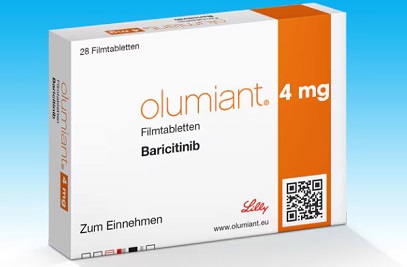The Impact Of JAK Inhibitors Such As Baricitinib On Kidney Injury In Early COVID-19
Nikhil Prasad Fact checked by:Thailand Medical News Team Apr 20, 2024 1 year, 9 months, 4 days, 16 hours, 43 minutes ago
COVID-19 News: The emergence of the coronavirus disease 2019 (COVID-19) brought with it a multitude of challenges, not limited to respiratory distress but also encompassing significant renal complications. Kidney injury, including acute kidney injury (AKI) and abnormal urinary findings, is a recognized consequence of Severe Acute Respiratory Syndrome Coronavirus 2 (SARS-CoV-2) infection. While the primary route of SARS-CoV-2 entry is through angiotensin-converting enzyme (ACE) 2 receptors, prominently expressed in the lung, they are also found in the kidney, particularly in tubular epithelial cells and podocytes. Despite this, direct viral invasion of the kidneys remains a topic of debate, with conflicting evidence regarding the presence of SARS-CoV-2 in kidney biopsies from COVID-19 patients. This ambiguity underscores the need to delve deeper into the mechanisms underlying renal disturbances in COVID-19. This
COVID-19 News report covers a study by researchers from Osaka University-Japan that found that JAK inhibitors such as baricitinib when used in the early phases of SARS-CoV-2 infection, actually leads to or worsens kidney injury.
 The Impact Of JAK Inhibitors Such As Baricitinib On Kidney Injury In Early COVID-19
The Role of JAK Inhibitors in COVID-19 Treatment
The Impact Of JAK Inhibitors Such As Baricitinib On Kidney Injury In Early COVID-19
The Role of JAK Inhibitors in COVID-19 Treatment
As medical interventions for COVID-19 evolve, treatments have included a spectrum of approaches from antiviral therapies to immunosuppression strategies like steroids, anti-interleukin (IL)-6 receptor antibodies, and Janus kinase (JAK) inhibitors. The rationale for employing JAK inhibitors lies in their ability to mitigate cytokine-induced injury, particularly relevant in severe cases of COVID-19 where cytokine storms wreak havoc on various organs. Notably, interferons (IFNs), which activate JAK1/2, are upregulated in COVID-19 patients, further implicating the JAK pathway in the disease process.
The Study: Insights from Murine COVID-19 Models
To gain deeper insights into renal pathophysiology in COVID-19, the Japanese study team conducted a study utilizing a murine COVID-19 model induced by nasal infection with mouse-adapted SARS-CoV-2 (MA10). This model allowed for the observation of both lung and kidney injury following SARS-CoV-2 infection, mimicking clinical manifestations seen in COVID-19 patients.
Findings from the Study
The study revealed several crucial findings:
-Kidney Injury in MA10-Infected Mice: MA10 infection led to kidney injury as evidenced by increased serum creatinine levels, urinary albumin/creatinine ratio, and tubular damage observed through histological analysis.
-Cytokine Storm and Renal Homeostasis: The absence of detectable MA10 in the kidneys coupled with elevated cytokines like interferon (IFN)-γ and interleukin-6 (IL-6) in the sera suggested that the kidney injury was more likely a result of the cytokine storm induced by MA10 infection rather than direct viral invasion of the kidneys.
-Antiviral Path
ways and JAK Inhibition: RNA-sequencing analysis highlighted the upregulation of antiviral genes, particularly those involving the IFN/JAK pathway, in MA10-infected kidneys. However, administering the JAK inhibitor baricitinib during the early phase of infection suppressed these antiviral pathways, leading to an increased presence of MA10 in the kidneys and exacerbation of kidney injury.
Clinical Implications
The study's findings shed light on the critical role of endogenous antiviral activity, mediated through JAK kinases, in protecting against SARS-CoV-2-induced kidney injury during the early stages of infection. This insight is invaluable for guiding therapeutic strategies, especially concerning the timing and use of JAK inhibitors in COVID-19 patients to prevent renal damage.
Discussion: Implications for Clinical Practice and Future Research
The study's outcomes have significant implications for clinical practice and future research directions in managing COVID-19-associated nephropathy:
-Timing of JAK Inhibitors: The study underscores the importance of timing in administering JAK inhibitors, suggesting that early-phase JAK inhibition during SARS-CoV-2 infection may exacerbate kidney injury due to the suppression of vital antiviral pathways.
-Combination Therapies: Considering the synergistic effects of antiviral drugs like remdesivir with JAK inhibitors, careful consideration is needed in designing combination therapies to ensure optimal outcomes, particularly regarding renal function.
-Patient Stratification: Insights into the impact of JAK inhibitors on kidney injury call for a stratified approach in treating COVID-19 patients, especially those with pre-existing conditions such as rheumatoid arthritis where JAK inhibitors are commonly used.
-Further Research Avenues: The study opens avenues for further research into the intricate interplay between viral pathogenesis, host response mechanisms, and therapeutic interventions, aiming to refine treatment strategies and improve patient outcomes in COVID-19.
Conclusion: Navigating the Complexities of COVID-19 Nephropathy
In conclusion, the study by Japanese researchers at Osaka University unravels crucial aspects of COVID-19-associated nephropathy, emphasizing the delicate balance between viral suppression and immune response in the kidneys. By delineating the impact of JAK inhibitors on renal injury, the study paves the way for more nuanced therapeutic approaches tailored to individual patient profiles and disease stages, thereby enhancing the management of COVID-19 complications and improving patient prognosis.
The study findings were published in the peer reviewed journal: American Journal Of Physiology (Renal Physiology).
https://journals.physiology.org/doi/abs/10.1152/ajprenal.00011.2024
For the latest
COVID-19 News, keep on logging to Thailand Medical News.
